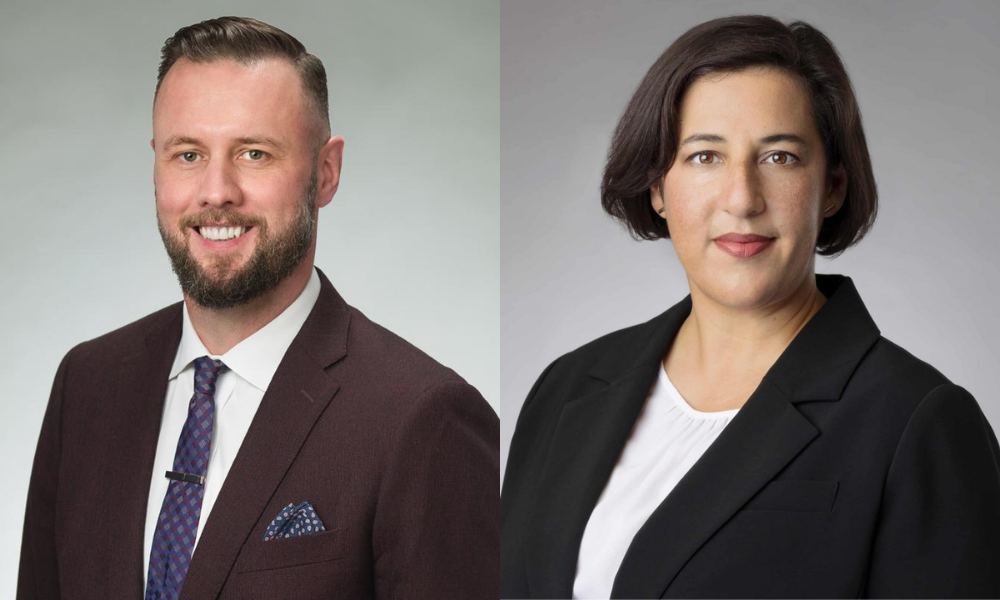As investor activism and social pressure grow, firms need better understanding of ESG practices

As public, private, and governmental agencies face greater scrutiny on environmental, social and corporate governance issues, MLT Aikins LLP has opened a new practice group to help clients develop comprehensive and meaningful strategies to deal with ESG concerns.
Led by Calgary lawyer Conor Chell and Samina Ullah in Saskatoon, the new ESG team has experience in a broad range of sectors, including carbon-intensive industries such as energy and mining. They also have skills in developing ESG strategies and identifying ESG risks and opportunities.
Chell notes that investors, financial institutions, and other stakeholders are looking for “more meaningful disclosure” on how organizations are addressing ESG risks.
“ESG strategies are now critical to accessing capital, and companies are increasingly being asked to demonstrate their commitment to ESG goals,” he says. Some surveys have found that 75 per cent of institutional investors polled say that they may divest from companies with poor ESG performance.
There also has been a rise in ESG-related investor activism, primarily targeted against publicly traded oil and gas companies.
One example involves an ESG activist investor group named Engine No.1. Last year, it won a battle to install several directors on Exxon's Board of Directors with the intent of forcing Exxon to tackle climate change in a more meaningful way. Rather than seeking control, Engine No. 1 acquired enough shares to gain a say in the company's governance.
On May 26, 2021, with less than US $40 million worth of common shares in Exxon (approximately 0.02 per cent of Exxon's shares), Engine No. 1 executed a proxy fight that resulted in its winning seats on the board of Exxon for three out of its four nominations.
Chell notes that Engine No. 1 had the support of large institutional investors, including BlackRock, Vanguard and State Street, who all voted against Exxon's leadership and in favour of the activist group.
Chell adds that among the biggest reasons for starting a specific ESG practice “from a legal perspective” is that it recognizes that mandatory ESG disclosure will likely be coming to Canada very soon.
As well, he says investment dollars are “flowing more readily into companies that are performing better on ESG goals or acknowledge that ESG commitments are an important strategic direction for the firm.”
With experience in acting as in-house counsel, Chell says he has developed expertise in dealing with the environmental side of ESG goals and some of the social aspects related to health, safety and Indigenous relations. Colleague Ullah also comes from an in-house legal background, with expertise in governance.
In addition, says Chell, “we recently hired an environmental engineer, so we're trying to build this practice to provide multidisciplinary services to clients.” While other law firms may have ESG practices, Chell says, “we think we're one of the first to take this sort of multidisciplinary approach and add this type of expertise.”
The new ESG practice will also rely on the benefits of being part of a full-service law firm with offices in British Columbia, Alberta, Saskatchewan, and Manitoba. “So, depending on the nature of the clients, we can bring in lawyers from different specialty areas, such as our Indigenous practice group or private equity and venture capital group.”
Chell says a base in Western Canada is also helpful for building an ESG practice. “Not only are energy companies looking at ways to meet ESG goals, but First Nations groups and the agricultural and natural resources sectors are an important source of potential clients.”
Ullah noted that “ESG is going to be a reality” for many companies, and firms will have to deal with it in many ways. From a governance perspective, Ullah notes a gap in the skill sets of boards and governing bodies to meet ESG goals.
“I see my role in helping companies understand where they are, where they need to be, and how to get there,” she says. As well, “it's important to help firms understand ESG goals from a risk perspective — especially when it comes to brand and reputation.”
On the governance side, Ullah says she has a strong background in areas such as anti-corruption, whistleblowing and conflict of interest rules, “all important components of governance.”
While investors, or those with financial interests in companies, are increasingly looking at ESG goals, it's also coming from non-financial stakeholders and “ordinary people” who want to see firms take a more substantial interest in making ESG commitments.
“There's pressure coming from all directions,” Chell says, “and we've seen the value that having a firm ESG strategy can bring to a firm.”










